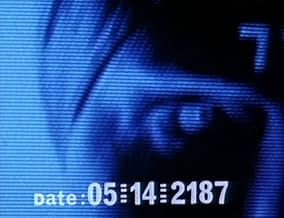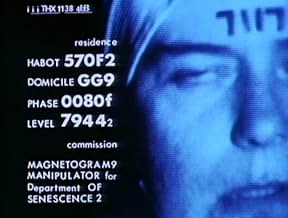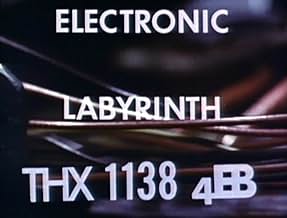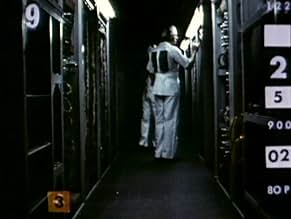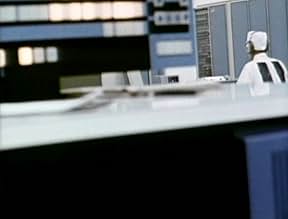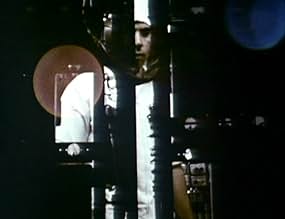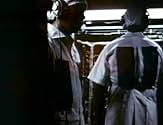Electronic Labyrinth THX 1138 4EB
- 1967
- 15m
IMDb RATING
6.2/10
2.8K
YOUR RATING
While monitored and pursued, a man races to escape through a futuristic labyrinth.While monitored and pursued, a man races to escape through a futuristic labyrinth.While monitored and pursued, a man races to escape through a futuristic labyrinth.
- Awards
- 1 win total
- Director
- Writers
- All cast & crew
- Production, box office & more at IMDbPro
6.22.8K
1
2
3
4
5
6
7
8
9
10
Featured reviews
This is Authority...
This is found on the 2-Disc George Lucas Director's Cut release of THX 1138 that came out in 2004. His student film. You're probably more familiar with the remake that he made(and everyone who's watched any of his work may have seen the four numbers appear somewhere, and he used the prefix as the title of his sound-system). This and especially the theatrical version of '71 had an ambivalent effect on his career in the field; the studio had no idea how to sell the latter, and it led to the downfall of the original dream of what American Zoetrope was. It also proved that he could make something otherworldly and unique, and he might not have made Star Wars(or it could have been less than it was) if not. This is very experimental, and its visual side is compelling and interesting. The sound is creative(given the constraints), and editing is skillful. In 15 short minutes, this manages to convey many of the themes he would explore to a greater extent in the feature-length quite subtly and without anything feeling staged. The acting is satisfactory. There is a bit of disturbing content in this. I recommend it to any fan of cinema that takes chances. 7/10
For a Student Film Very Advanced
Although very little happens in terms of action in George Lucas's best-remembered student film "Electronic Labyringth THX 1138 4EB", there is already plenty to be admired in the visual look alone, considering the assumed small budget they had to work with at the USC. As in all of Lucas's early shorts, the film is very well-made with lots of good craft on display: the locations and costumes, while not overly elaborate, give enough of an atmosphere to suggest an otherworldly environment. The editing is skillful as well, being an almost abstract mishmash of shots and snippets of audio which add to the intensity of the action a little, although it certainly doesn't possess the type of intensity Hollywood would make use of. That aside, the plot itself is rather skimpy and carries plenty of repetition in the images and soundtrack; to expect a greater narrative would be admittedly absurd for fifteen minutes, yet the fact that Lucas took even that long to convey what plot he had shifts the focus to the atmosphere and setting built into it, rather than specifically the plot.
The context of the story is rather unclear, although it is made more interesting simply because we are left to decipher what is happening. The film seems to be occurring in a Dystopian setting as the likes of George Orwell would come up with - a time when the higher powers have taken over, enslaving and ruling over those below them with an iron fist. In this version, the setting is an Electronic Labyrinth in a presumed future when technology has taken over to control the lives of others. The film follows a man, given the designated number 1138, as he attempts to do the unspeakable - escape the slavery of technology, running through shiny white hallways to make it out before he is destroyed by his oppressors. With consistent intercoms blaring instructions on how to stop him mixed with security cam footage and scenes of men in headsets pulling switches, the film's atmosphere is a unique one, repetitive yet oddly surreal, with enough creativity to the settings and costumes to make give it a futuristic feel. The unanswered questions are many, yet they add to the experience - so much so that I doubt I would benefit much if at all from seeing Lucas's 1971 feature film "THX 1138" which elaborates on things. Little plot definitely, yet enough to play with the viewer's mind while simultaneously giving clues through a well-built environment. Certainly remarkable for a student's work, technically and analytically speaking.
The context of the story is rather unclear, although it is made more interesting simply because we are left to decipher what is happening. The film seems to be occurring in a Dystopian setting as the likes of George Orwell would come up with - a time when the higher powers have taken over, enslaving and ruling over those below them with an iron fist. In this version, the setting is an Electronic Labyrinth in a presumed future when technology has taken over to control the lives of others. The film follows a man, given the designated number 1138, as he attempts to do the unspeakable - escape the slavery of technology, running through shiny white hallways to make it out before he is destroyed by his oppressors. With consistent intercoms blaring instructions on how to stop him mixed with security cam footage and scenes of men in headsets pulling switches, the film's atmosphere is a unique one, repetitive yet oddly surreal, with enough creativity to the settings and costumes to make give it a futuristic feel. The unanswered questions are many, yet they add to the experience - so much so that I doubt I would benefit much if at all from seeing Lucas's 1971 feature film "THX 1138" which elaborates on things. Little plot definitely, yet enough to play with the viewer's mind while simultaneously giving clues through a well-built environment. Certainly remarkable for a student's work, technically and analytically speaking.
Without this, no "STAR WARS"
George Lucas developed this film during his days in film school. It impressed his teachers and eventually gave him the courage to make "THX 1138," a full-length spin-off which was his theatrical debut and featured the talents of Robert Duvall and Donald Pleasence.
This was the basis for that spin-off, which is much shorter and doesn't feature any of the complicated themes of the semi-remake. Personally I feel the remake is far superior because of its advanced storytelling, visuals, acting, and love story, but that's just me (and I have a feeling most people probably like the remake better, too, but...).
The point remains that without this, George Lucas might never have impressed anyone. He might never have made "THX 1138." He might never have made "American Graffiti," and there would be no "Star Wars" because he wouldn't have convinced anyone to lend him the money.
There would be no THX sound on DVDs. There would be no ILM. There would be no Indiana Jones, no Luke Skywalker, nothing.
Hard to imagine, isn't it? All because of one small 15-minute, cheaply-produced short film...
This was the basis for that spin-off, which is much shorter and doesn't feature any of the complicated themes of the semi-remake. Personally I feel the remake is far superior because of its advanced storytelling, visuals, acting, and love story, but that's just me (and I have a feeling most people probably like the remake better, too, but...).
The point remains that without this, George Lucas might never have impressed anyone. He might never have made "THX 1138." He might never have made "American Graffiti," and there would be no "Star Wars" because he wouldn't have convinced anyone to lend him the money.
There would be no THX sound on DVDs. There would be no ILM. There would be no Indiana Jones, no Luke Skywalker, nothing.
Hard to imagine, isn't it? All because of one small 15-minute, cheaply-produced short film...
A very unique student film.
This was the student film that George Lucas did way before he became successful in cinema.
4 years before he made the THX 1138 film. He created this short film which is very well written.
The whole short has to do with THX, an individual trap in a sick twisted world. Which he tries escape throughout the whole short.
It's very different from the full length film. But those who are curious to know what the earlier version is. This one's definitely an early version.
All great director start somewhere in their careers. And this is a fine example of a student film.
It's available on the THX Director's Cut DVD.
4 years before he made the THX 1138 film. He created this short film which is very well written.
The whole short has to do with THX, an individual trap in a sick twisted world. Which he tries escape throughout the whole short.
It's very different from the full length film. But those who are curious to know what the earlier version is. This one's definitely an early version.
All great director start somewhere in their careers. And this is a fine example of a student film.
It's available on the THX Director's Cut DVD.
The roots of Lucas
While monitored and pursued, a man races to escape through a futuristic labyrinth.
Lucas had had an idea for a long time "based on the concept that we live in the future and that you could make a futuristic film using existing stuff". Fellow USC students Matthew Robbins and Walter Murch had a similar idea which Robbins developed into a short treatment, but Robbins and Murch lost interest in the idea, whereas Lucas was keen to persist.
Because of the USC's Navy connection, Lucas was able to access filming locations which would not otherwise have been available to him: the USC computer center, a parking lot at UCLA, the Los Angeles International Airport, and the Van Nuys Airport. Much of the filming was done at night, with some at weekends.
This film's value is in the fact it is a root. By itself, it is a very good student film, but still just that: a short student film. But we know what came of this. It turned into a feature-length film, it caught the attention of Steven Spielberg, and soon we had "Star Wars" and "Indiana Jones". Without this, we would have none of that, and Harrison Ford would be unemployed.
Lucas had had an idea for a long time "based on the concept that we live in the future and that you could make a futuristic film using existing stuff". Fellow USC students Matthew Robbins and Walter Murch had a similar idea which Robbins developed into a short treatment, but Robbins and Murch lost interest in the idea, whereas Lucas was keen to persist.
Because of the USC's Navy connection, Lucas was able to access filming locations which would not otherwise have been available to him: the USC computer center, a parking lot at UCLA, the Los Angeles International Airport, and the Van Nuys Airport. Much of the filming was done at night, with some at weekends.
This film's value is in the fact it is a root. By itself, it is a very good student film, but still just that: a short student film. But we know what came of this. It turned into a feature-length film, it caught the attention of Steven Spielberg, and soon we had "Star Wars" and "Indiana Jones". Without this, we would have none of that, and Harrison Ford would be unemployed.
Did you know
- TriviaThe "EB" referred to in the title means "earth born" according to the original script writer.
- GoofsDuring the credits where George Lucas is mentioned as the director, a piece of transparent tape is visible on the left side of the screen.
- ConnectionsFeatured in Omnibus: George Lucas - Flying Solo (1997)
Details
Contribute to this page
Suggest an edit or add missing content

